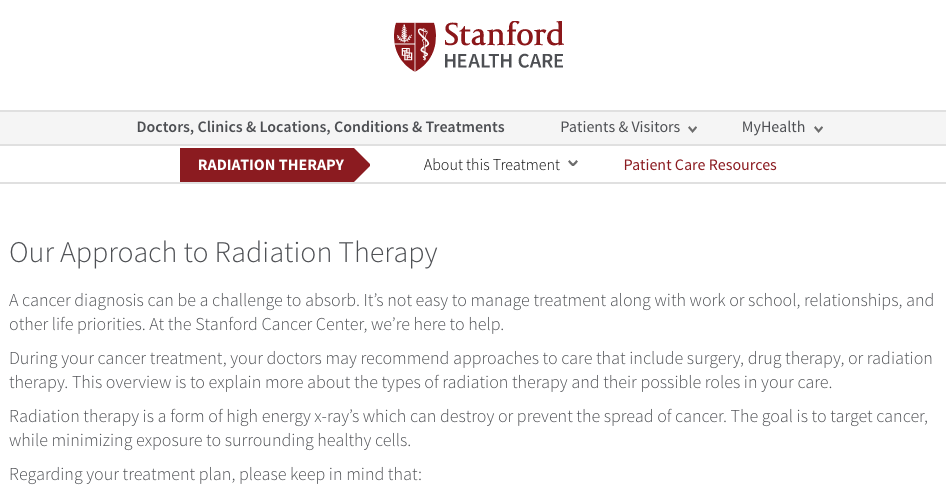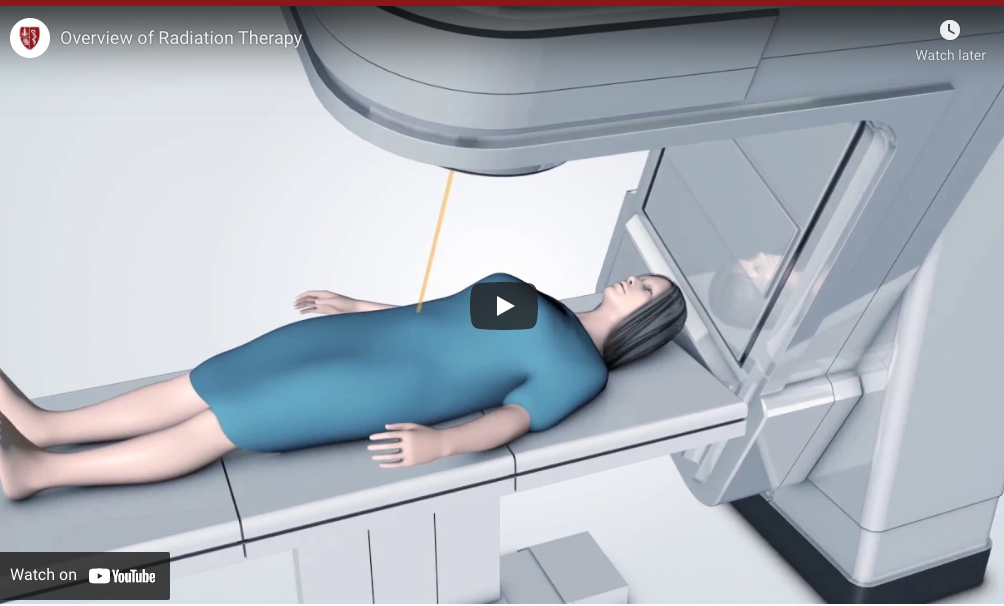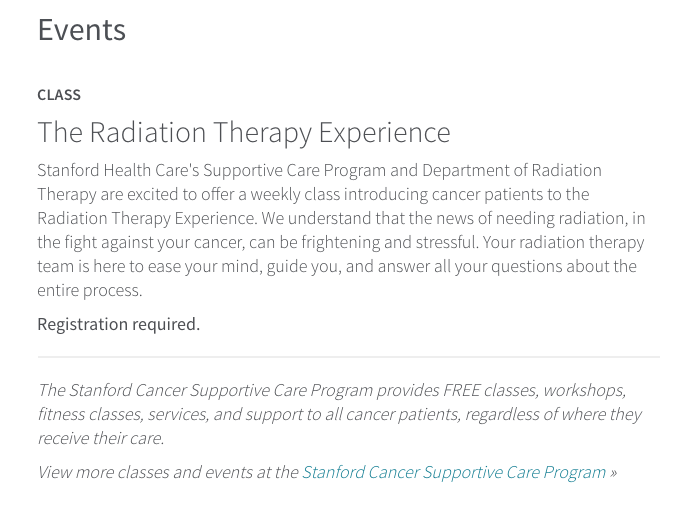





Exploring Stanford’s Resources

Stanford offers many resources to help you and your loved ones navigate your radiation and cancer experience.
- Additional radiation therapy resources at Stanford
- Stanford resources that you can access directly
- Stanford resources that are available through your care team
Additional Radiation Therapy Resources at Stanford
Nutrition During Radiation Therapy
Eating well helps build your strength during and after radiation therapy and can lessen some of the side effects. Even so, it isn’t always easy. Cancer and cancer treatments can make it harder for your body to get what it needs from your food. Sometimes you may just find it hard to eat.
On the other hand, you might enjoy food throughout most of your cancer treatment. It’s hard to know in advance how you will react. In general, if the food you are eating is not bothering you, then it is usually ok to eat.

There are things you can do to help you eat well during treatment.
These include:
- Maintain your weight before, during, and after your treatment
- Maintain adequate fluids and nutrition

Your care team is a great resource. Here are some ways they can help.
Your care team can:
- Share information with you on eating well that is specific to your type of cancer and treatment
- Help you make sure you get the amount of fluids you need and are eating to help you build strength throughout your radiation therapy
- Have you speak to someone on their nutrition team
My Blue Dots
My Blue Dots is a non-profit organization founded by Sue McCollum, a former Stanford Health Care cancer patient. This organization honors those that have gone through the cancer experience, as well as informs, educates and supports those going through the experience.
The blue dots symbolically represent the dots that were once tattooed on the skin of cancer patients to guide the radiation treatments, (although tattoos are not used much anymore).
“My Blue Dots” Pins
My Blue Dots salutes and honors all those who are going through a cancer experience.
The “My Blue Dots” pin represents a badge of courage to those who complete their treatments at Stanford Health Care. They were created to provide patients, their loved ones, caregivers and health care team a symbol to show support for those going through the cancer journey.
- Patients receive a silver “My Blue Dots” pin at the end of treatment.
- Gold “My Blue Dots” pins can be purchased for family members and loved ones on the My Blue Dots website.
The Radiation Therapy Patient Experience
In addition to this online program, get more information about having radiation therapy at Stanford on our website, watching videos, or by attending our onsite classes. We provide the education you need in the format that works best for you.
Click on each link below to learn more about each resource.
Stanford Cancer Resources
Resources That Can Be Accessed Directly by You, Loved Ones or Caregivers
Stanford provides a variety of cancer resources, from education to classes and workshops, that you can access directly (most are free for cancer patients, their caregivers and loved ones).
Cancer Supportive Care Program
The Cancer Supportive Care Program provides support groups, classes, workshops, personal one-on-one consultations and services. All are open to all cancer patients in the community.
Stanford Caregiver Center
Caring for caregivers with support, resources, and education.
Learn more at the Stanford Caregiver Center.
Financial Counseling
We know that many of you have questions about insurance and how to pay for your care. Meet with one of our financial counselors to find the best approach to paying for your health care.
There are a variety of options available for those with limited or no insurance.
Financial counselors are available:
- Monday – Friday
- 7:00 am – 6:00 pm
- Call 650-498-2900
- Visit the Financial Counseling website
MyHealth
MyHealth is an essential tool if you are a Stanford Health Care patient or caregiver.
- You have instant and secure access to your health information.
- At every step of your health journey, MyHealth makes managing your health easy and convenient.
- Get a MyHealth account online
- Complete a “Share Access Request Form“ to give a family member or caregiver access.
Patient & Family Resource Guide
The Patient & Family Resource Guide is a comprehensive guide and workbook to assist patients with their cancer experience at Stanford.
Social Work & Case Management
Social Work & Case Management supports patient and caregivers’ ability to manage stress while coping with a cancer diagnosis and treatment.
Stanford Health Library
Our medical librarians provide information searches, at no charge, for all your medical or health-related questions.
The Health Library is available:
- Monday – Friday
- 9:00 am – 5:00 pm
- Call # 650-736-1960
- Email: healthlibrary@stanfordhealthcare.org
- Visit the Stanford Health Library website
Spiritual Care Service
Whether you are a Stanford Health Care patient, family member, friend or staff member, Spiritual Care Service is here to compassionately accompany you with open-hearted conversation about hope, gratitude, fear, connection and meaning.
Spiritual Care Service is available:
- Monday – Friday
- 8:30 am – 5:00 pm
- Call 650-304-8992
- After Hours 650-723-5101
- Email: spiritualcare@stanfordhealthcare.org
- Spiritual Care Service website
Help to Quit Smoking
The Tobacco Treatment Service at Stanford Health Care provides services that are available in-person at the Cancer Center or through telemedicine:
- One-on-one meeting to build motivation and develop an individualized treatment plan
- Group behavioral therapy
- Mindfulness skills coaching
- Support and education
- Streamlined referral for nicotine replacement therapy and medications
Program available:
- Monday – Friday
- 8:30 am – 5:00 pm
- Call 650-725-9456
- Email:
cancersupportivecare@stanfordhealthcare.org
Location:
Stanford University School of Medicine
401 Quarry Road
Stanford, CA
Resources That Can Be Accessed Through Your Care Team
Stanford provides additional services to support your care and treatment. Speak with your care team to find out how they can help you access these services.
Clinical Cancer Genetics Program
The Clinical Cancer Genetics Program has healthcare professionals who can help:
- Assess your hereditary risk of cancer
- Provide information on current genetic testing options
- Discuss ways in which genetics contribute to cancer
Palliative Care
Palliative care focuses on improving the quality of life for patients and their families through the management of symptoms, pain and stress brought on by a serious illness.
Step 1:
Ask your oncologist for a referral to Palliative Medicine
Step 2:
Call 650-497-1290 to schedule your appointment
Physical Therapy
Physical therapy may help you:
- Improve your flexibility, coordination and balance
- Regain your mobility and strength
Clinical Trials
Clinical trials play an important role in developing new ways to prevent, diagnose and treat different types of cancer.
- If you are interested in participating in a clinical trial or have specific questions related to your diagnosis and treatment, speak with your oncologist.
- For general questions about clinical trials, call 650-498-7061 and select option 3.
Psycho-Oncology Program
Our team of psychiatrists, psychologists and nurse practitioners in the Psycho-Oncology Program offer psychiatric consultation, brief therapy and emotional support to patients with cancer.
Nutrition Services for Cancer Patients
License nutritionists, specializing in cancer nutrition counseling, support patients concerned about maintaining proper nutrition before, during, and after cancer treatment.
Step 1:
Ask your oncologist for a referral to Nutrition
Step 2:
Call 650-497-1290 to schedule your appointment
Learn more at the Nutrition Services for Cancer Patients website.



